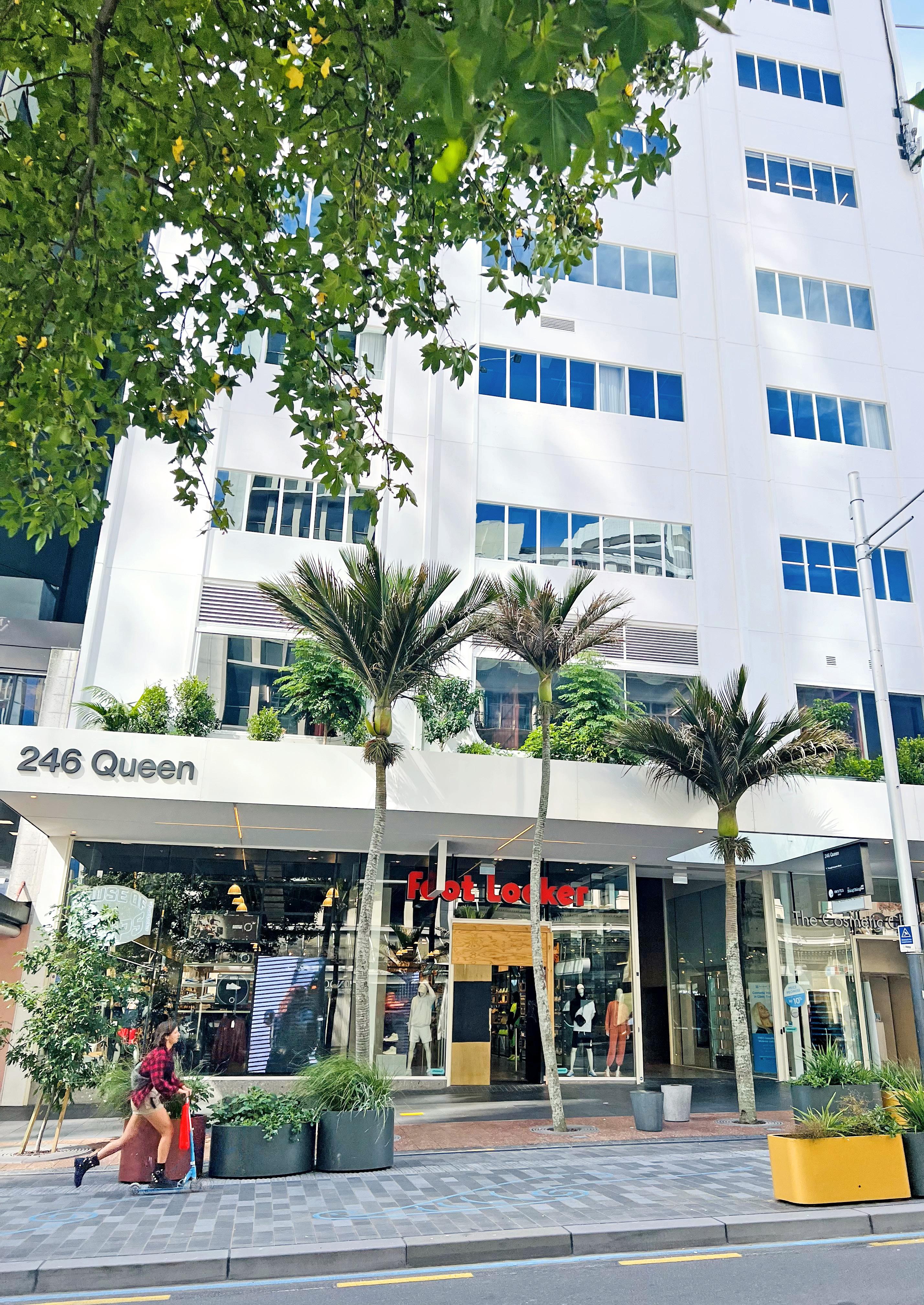Auckland Central Market Report.





Part of the group with a family factor.


04. Market CommentTwo steps forward...
06. Article – Kelvin Davidson: Will the Reserve Bank signal another hike in the OCR?
08. Auckland Central Statistics July 2023
10. Recent Sales July 2023
12. Auction Statistics & Update with Cameron Brain
14. Article – Tony Alexander: Why house price rises are set to rise despite high interest rates
16. Property Management Market Comment
18. LoanMarket Update
20. Marketing your property
22. Ray White Auckland Central Meet the team



Mixed messages in the housing market are likely to confuse the public, reports Director of City Realty Group, Daniel Horrobin.
On the one hand, positive reports about demand outstripping supply appeared in the NZ Herald One Roof on 4 July 2023:
“Demand finally outstripping supply”
A sharp drop in new listings volumes in some of the country’s biggest housing markets could be an opportunity for vendors.
However, the listings drought comes at a time when sales activity is picking up and auction rooms in Auckland and Christchurch are busier.
OneRoof is also increasingly hearing from agents that buyer demand is currently outstripping supply”.
A West Auckland Agent was quoted “Prices in general haven’t gone up, but people have started to make decisions”.
Likewise, Daniel reports positive activity from Ray White’s Sandringham office Auction Room in mid July. “I arrived at our Sandringham office Auction Room and couldn’t find a seat…
One auction, with eight registered bidders and five active bidders,which sold under the hammer”.
And Stuff reported more positive news for the housing market on 31 July 2023:
Months of falling house prices are coming to an end and factors are building to support the market according to one of the world’s largest banks.HSBC economist Jamie Culling.
The ‘one step back’ has been seen by banks providing a mixed message through their actions. Daniel says “Just when the market is showing signs of bouncing back, four major banks moved to lift their home loan rates, heaping more pressure on mortgage holders”.
“However”, continues Daniel “there will be heightened interest in the upcoming election, fast approaching, with National this month
announcing their intention if elected to:
• Restore full interest deductibility for rental properties
• Take the bright-line test back to two years (from 10)
• Reintroduce 90 day notice periods for tenants and
• Change the automatic roll-over of fixed-term tenancies into periodic tenancies
Daniel says: “This is not necessarily good news for first-home buyers but should a Nationalled government follow through, it will certainly restore investor confidence in the property market in general and specifically our CBD apartment market. It will also assist with the supply of available rental stock, which is so badly needed.”
In terms of rentals, landlords are asking tenants to pay $50 more a week on average than last year, with the national median rent on Trade Me up 9% annually in June. Rents in Auckland were up 11.7% annually to a median of $670. Nationwide, the number of properties listed for rent was down 19% in June, from the same time last year, while demand was up 35%. Migration has upped demand for city apartment rentals.
Overall, despite banks increasing interest rates, there are positive signs the city apartment market and the wider housing market is moving in the right direction.
Daniel has some final advice for those wanting to sell but waiting.
“The number of properties for sale in the central city has dipped below 500 for the first time in recent memory. That will change, and fast. With spring around the corner and buyer activity building, waiting may mean you are competing with a legion of vendors who waited just like you”.

The five things you need to know about the housing market this week.

The biggest event this week in terms of the economy and the property market will be the latest Monetary Policy Statement (MPS) from the Reserve Bank, at 2pm on Wednesday. There’s almost no chance the RBNZ will change the official cash rate (OCR), but its projections and commentary about the coming 3-6 months will be very interesting – in terms of overall economic growth, employment, inflation, house prices, and of course the OCR itself. My expectation is that the OCR won’t need to be raised again in this cycle, partly because the lagged effects of previous sharp increases are still working their way
through the system, especially for those borrowers who are yet to fully reprice mortgages from older/lower rates onto current higher levels. But other economists aren’t so sure, with some anticipating one more OCR increase, probably in November. To that end, any tweaks within the MPS to the forecast cash rate path, perhaps to push back the timing for any eventual cuts, could suggest that the RBNZ is also still very worried about inflation – and that another OCR rise couldn’t be ruled out just yet.
As noted, I’m less concerned about that, and I think we can still say in general terms that mortgage rates have peaked. But if that’s wrong, the risks are still slightly more weighted towards the upside rather than the downside.
The Reserve Bank’s latest figures (for Q2) on mortgage lending by debt to income ratios will be a fascinating set of data, due out Tuesday this week. Recently the amount of lending at high DTIs has already fallen – partly because higher mortgage rates naturally limit how much debt can be serviced from a given income – and the latest figures will probably show more of the same.
But we’ve always said that if formal DTI limits are introduced next year, it’s not so much about this cycle anyway; it’s more about preventing a repeat of the postCOVID boom when mortgage rates do eventually drop back again – by tying long run house price growth more closely to incomes, and limiting how many properties anybody can own at any given point in time.
Stats NZ’s net migration data for June are due out this week too, and although the figures have been showing signs in the past few months of just easing back a little (as departures rise and arrivals to NZ of non-citizens dip), they’re still very high –and that will be boosting overall property demand. If anything, June’s numbers may continue the gradual slowdown, but won’t change the overall story too much; which is ongoing population growth, and more need for housing.
The Reserve Bank’s latest monthly data on new lending showed that the majority of people still fix (80%) their mortgages rather than float (20%). But within that fixed segment, there’s been quite a shift in the terms chosen – e.g. in March, 35% of loans were on 1-year fixes, 24% 2-years, and just 4% on three years. But in June, those figures had shifted to 28%, 18%, and 16% –i.e. a big rise in popularity for terms longer than two years.
Of course, it’s not hard to see why preferences have changed, given that three-year fixed rates have gone below the one-year rates since March. In other words, many new borrowers (or those topping-up or shifting banks) are simply still choosing the lowest rates on offer – probably because of affordability considerations right now, even if that raises the risk of overpaying further down the track, in the event that market rates drop sharply before that three-year fixed term has expired.
5.
Stats NZ’s figures last week showed that rental growth (based on new bonds lodged) rose from an annual rate of 3.5% in June to 4.1% in July – above the average of around 3% and also the fastest rate since June last year (5.1%). This is something that has always been on the cards, given increasing wages, but also restricted rental listings and rising demand (hence falling vacancy rates). Further rises in rents seem likely in the coming months, which is obviously favourable for landlords but not tenants –although the long-term pace of growth may still be capped due to the fact that rents are already high in relation to incomes.

Total Sales
July 2023
78
July 2022
There was a -13% decrease in the total number of sales year on year.
July 2023
$286,350
July 2022
Total Sales Value
July 2023
$28,750,330
July 2022
90 $46,076,272
There was a -37% decrease in the total sales value year on year.
Source: REINZ
$319,000
There was a -10% decrease in the total median sale price year on year.
Median Sales Price Median Days On Market
July 2023
35
July 2022
42
There was a -16% decrease in the total median days on market year on year.

Sales data is from REINZ and covers the entire Central Auckland property market.


Ray White Auckland Central’s auction business is gearing up for an exciting and bustling few months ahead. With the onset of the Spring Market, anticipation is building for a flurry of real estate activity. The timing coincides with the New Zealand Election in October, a period known to influence market sentiment and dynamics. As a trusted player in the industry, Ray White Auckland Central is well-positioned to navigate and leverage these converging factors.
A significant element adding to the anticipation is the large percentage of fixed-term interest rates set to expire soon. This potential influx of buyers seeking new mortgage options could inject further momentum into the real estate market. Ray White Auckland Central’s astute understanding of market trends positions them to offer tailored advice and opportunities to both buyers and sellers.
Amidst this dynamic landscape, Ray White Auckland Central boasts an impressive 71.43% clearance rate, with a commendable 45.11% of properties being sold under the hammer. These figures underline the agency’s

prowess in connecting sellers with motivated buyers and facilitating successful transactions. Notably, the consistent increase in active bidders at their auctions throughout 2023, averaging 2.7 participants, is a testament to the agency’s growing reputation and appeal in the market. As the spring and election season unfold, Ray White Auckland Central is poised to continue its impressive track record and uphold its commitment to excellence in real estate services.
If you are thinking of buying or selling at Auction and would like to know more, I would welcome the opportunity to see how we can help. Contact me anytime;

A lot of frustrated buyers will step forward when the Reserve Bank signals cuts.
ANALYSIS: Since December last year the number of properties which buyers can peruse has fallen 15%.


In Auckland stock levels have fallen 20% from the peak in August last year. In Wellington stocks are down 49% from the same month while in Canterbury the decline is 11% from the peak in March. These falls don’t mean that buyers are struggling to find something to purchase as the average nationwide level of stock for the past five years has been almost 22,000 – below the end of July 2023 number of around 24,000. Auckland’s five year average is 8600, below the end of July number of 9000.
There has also been a lift in the net
proportion of real estate agents in my monthly survey saying that they are receiving more requests from potential vendors for appraisals – to 33% from just 13% in lateJune. But the good jobs growth recently and only small rise in the unemployment rate to 3.6% suggests that very few property owners are likely to be feeling that they have to sell and downsize or go renting for a while. But there will be some and this suggests that these people alongside those who have waited for the market to stabilise before looking to sell will be stepping forward over the remainder of this year.
But history tells us something about what happens when our real estate market picks up. More buyers step forward than sellers. The relevance is that maybe not so much this year but instead through 2024, stocks of
listings around the country are likely to fall at a rate which may surprise many people. This will become one of the factors causing an acceleration in the pace of price gains next year.
As for prices in the near future, I wouldn’t be surprised to see one or two more months of falls before the year is out. That is what can happen when an asset price cycle turns. It is also the case that a lot of people wanting to buy simply cannot get the finance when banks are applying test mortgage rates close to 9%.
That then is where monetary policy becomes very relevant. At some stage the Reserve Bank is going to feel that inflation risks have shifted enough to allow them to send a firm signal that a cut in interest rates is just around the corner. When they do a lot of frustrated buyers will start stepping forward.

But we are nowhere near that point yet and the next monetary policy review coming up on August 16 is unlikely to contain anything
immediately positive for borrowers. Falling interest rates are best viewed as something coming in 2024 – but whether these falls get underway early or late in the year is essentially anyone’s guess still because there remains extreme uncertainty about the many factors which affect inflation. And it pays to note that there is little basis currently for believing that when rates fall the declines will be especially large.
Around the world there are signs that inflation is not going to settle as comfortably back near 2% as was the case before the 2008-09 Global Financial Crisis, and worries about deflation of 2019 seem near impossible to envisage. That is why not everyone is fixing their mortgage rates for just one year or even two. Some borrowers are going longer, willing to bet that the likes of climate-induced inflation and tight labour markets keep inflation and therefore interest rates relatively elevated for the next few years.



Here’s a summary from a recent article written by Miriam Bell on Stuff.co.nz
• The property website’s latest Rental Price Index put the national median rent at a record high of $620 a week in June, up from the previous record of $610 in May.
• In June last year the national median rent was $570 a week.
• Rents in Auckland were up 11.7% to a median of $670.
• Nationwide, the number of properties listed for rent was down 19% in June, from the same time last year, while demand was up 35%.
• On a monthly basis, supply was down 5% nationwide in May, and demand was down 6% which is in line with the typical market trends during winter.
• BNZ chief economist Mike Jones has said the pace of rent increases has picked up, and that was likely to continue, particularly in places where supply was stretched.
• Economist Tony Alexander’s latest survey of landlords showed the amount who planned to raise their rents over the coming six months had remained at elevated proportions of around 81% since March.
• It also showed the average increase landlords would like to get, subject to market conditions, had risen to 6.3% in July, from 5.9% in June.
• Alexander said that was likely to reflect the impacts of rising costs alongside growing tenant demand, and was assisted by the acceleration in population growth currently underway.
Landlords are asking tenants to pay $50 more a week on average than last year, with the national median rent on Trade Me up 9% annually in June.
According to the latest research from Consumer NZ The Bank of Mum & Dad or BOMD, is the fifth-largest lender of owneroccupied loans for young home buyers.

Here are some of the most common ways BOMD can help you get into home ownership sooner: While I refer to parents, there could also be other family members or even friends that can also assist.
Craig Pettit
027 249 0010

Using equity in the family home. One way parents have been able to help their children if they are struggling to come up with the required deposit for their own home, is to borrow against the family home to make up the difference.
The Gifted Deposit. A gifted deposit is a sum of money given to a homebuyer by a parent or a close family member that is then used as part of the deposit on a home purchase.
The Guarantor.
If your parents have enough equity in their home, then they could act as a “Guarantor” on part of your loan.

The Co-Borrower.
Also known as a Joint Borrower or Co-Own. This option is more suitable for parents that are working full time as all incomes will be taken into account for debt servicing.
So as you can see there are many ways to get onto the property ladder whether you have support from your family or take advantage of the government assistance on offer.
Contact me directly to discuss your personal financial situation and I may be able to make suggestions that will make that home ownership dream a reality.

The marketing strategy is designed to reach the breadth of the active and passive buyer pool in the most effective manner, based on their Media consumption.
Our marketing strategy comprises of 3 key components; property portals, social and multi-channel digital strategy and print media.
There are 3 key portals, TradeMe Property, Realestate.co.nz and Oneroof.co.nz.
Property Portals generally attract active byers in the market, OneRoof has a unique position as it reaches both active and passive property buyers due to the diversity of information it has on the platform including property
The Ray White City Realty Group has introduced a state-of-the-art digital solution that is powered by artificial intelligence to reach the breadth of the active and passive buyer pool across social media and multiple digital channels, including news and other high traffic websites. The programme is fully automated in the back end, it creates an audience
listings, estimated property values, market news and commentary. It is important to run campaigns across all 3 to effectively cover the breadth of the active buyer pool and a part of the massive buyer market. None of the property portals have complete market coverage and each of these portals have a set of unique audiences.
segment of active buyers specific to the property as well as reaching the passive buyer pool. The campaign is structured to deliver quality leads for the property, and it auto optimises spend across social media and multiple digital channels, skewing the spend towards channels that are performing the best.
Print continues to play an important role to cover the breadth of the market reaching quality and highly engaged audiences. It takes criteriabased search out of the equation with respect to the active market and is the most effective medium to reach the all important passive buyer
market. This is clearly evidenced by the fact that the New Zealand herald has seen a massive 48% increase in its print readership over the last 18 months and average time spent reading the paper is over 50 minutes. The value of print is also well supported by agent feedback.

Based in the heart of Auckland City, Ray White Auckland Central is an award-winning agency in Auckland City that specialise in apartment sales for investment, luxury waterfront and lifestyle.

Our 183+ dedicated professionals who understand this unique market, are all top performers who have contributed to our phenomenal results. As the Auckland central market continues to experience unprecedented growth, our Lorne Street & Wynyard Quarter offices are well positioned to maintain its leadership in the market.

0800 002 420
www.rwaucklandcentral.co.nz
City Realty has a strategic partnership with LoanMarket, to provide clients with the best mortgage advice and rates with brokers throughout our offices that provide Home Loans, First Home Buyers Loans, Construction Loans, Refinance, Selfemployed Loans and Vehicle Finance – whatever the loan, LoanMarket can help.
Our office achieved the No.4 Ray White office in the world for 2018 and the No. 2 Ray White office in New Zealand for 2018 and we do the highest volume of sales across all agencies in New Zealand.


























OUR LOANMARKET MORTGAGE ADVISORS













WE CAN NEGOTIATE A LOWER RATE. WORK WITH A QUALIFIED AND COMPETENT MORTGAGE ADVISER






Our strongest team yet. Selling right across Auckland Central






